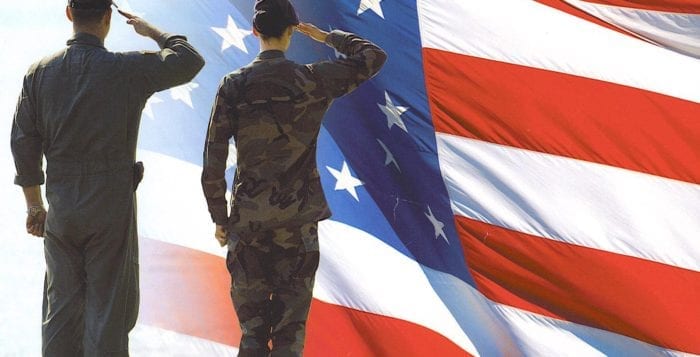The historical significance of Memorial Day throughout the years
Our national remembrance of Memorial Day had its roots after this nation fought the Civil War that ended in April of 1865.
Former veterans remembered their comrades after the terrible fighting of this four-year war in Waterloo, New York, in 1866.
Almost, a year after the fighting came to an end, the residents of this upstate town used flowers and flags to pay tribute to those citizens that were impacted by this war.
In 1868, General John A. Logan called for the nation to show unity in honoring the soldiers from both regions, as he stated that the battle scars and losses were felt within every American town.
“Decoration Day” was loosely recognized by most states until 1971, when “Memorial Day” was established by the government as a federal holiday. Through a three-day weekend, the blooming of flowers paid tribute to those men and women that served to protect this proud nation.
On this day, Americans take a moment to understand the historic examples of military service that has strengthened this country since the creation of our republic.
From May 18 to July 4, 1863, General Ulysses S. Grant was in position to drive a decisive wedge against the Confederate ability to carry out this war. At this time, Grant was in the midst of a 47-day siege against the mighty fortifications and gun emplacements that hindered the Union transportation on the Mississippi River.
Since December of 1862, Grant struggled to overtake this southern post that was called the “Gibraltar of the Confederacy.”
For several months, Grant sought one scheme after another that failed within his goals of taking control of these powerful guns that proved impossible to overcome. The press turned against Grant, whom they wrote was heavily drinking on duty and should be replaced by Lincoln. Even this president who appreciated the fighting devotion of Grant believed that he was the only friend that Grant had within the government.
On April 16 and 17, Grant gambled perhaps the entire war, by moving his forces under all of the guns at Vicksburg to operate south of these enemy forces. Even as the Confederates opened fire, Grant who was accompanied by his wife and son, observed that his entire flotilla of ships that held men and materials were practically unscathed by this assault.
Now, Grant was within the interior of the state of Mississippi, where he successfully fought several battles, took over the capital of Jackson, and pushed General John C. Pemberton back to the gates of Vicksburg. Lincoln was ecstatic over the fighting exploits of Grant, and this was shown when he was visited by several congressional leaders.
They were alarmed at reports that this general was drinking too much alcohol while he led this massive army. The President listened to the complaints against Grant and firmly stated that whiskey should be allocated to his other generals that have yet to fight and win any significant battles.
By June of 1863, he established a siege of Vicksburg, where these heavy artillery guns were useless to the southerners, and it was only a matter of time before this position was captured by Grant on Independence Day of 1863.
Grant was at the cusp of the largest victory of the war, where he proved that Lincoln was correct to stick with this general that was widely criticized after the Battle of Shiloh and during the earliest attempts to take Vicksburg.
Closer to home during World War I, Camp Upton that is now known as Brookhaven Laboratory, played a pivotal role in preparing American soldiers for the rigors of this conflict.
Once President Woodrow Wilson finally declared war on Germany and the Central Powers on April 2, 1917, the United States compared to the European powers, had a small force of 127,000 soldiers, with 181,000 National Guardsmen.
While Wilson kept “our boys out of the war” before he was re-elected in 1916, the President was now responsible to prepare our soldiers that were mostly drafted into service to fight against the battle-hardened strength of Germany.
At once, the government invested three billion dollars to raise, equip, and modernize the armed forces within an extremely brief period of time. Eventually 40,000 soldiers from mostly New York, New Jersey, and Connecticut received their earliest instruction at Camp Upton.
They were comprised of more than twenty-five national backgrounds that came from different walks of American life. There was musical composer Irvin Berlin and one of the most decorated veterans of this war, Sergeant Alvin York, briefly called this part of Yaphank their home.
This army base that was established at Camp Upton played a vital role in establishing the training that was necessary to fight an experienced German military on the Western Front.
At this moment, the local towns of Rocky Point, Miller Place, Ridge, Middle Island, Wading River, and Yaphank, watched a huge influx of civilians from around this nation walked into the confines of Camp Upton. As we remember Memorial Day, it was some-105 years ago, that these soldiers were trained how to march, shine their boots, make a bed, follow orders, fire a weapon and handle explosives at this local base.
While Camp Upton was across the vast Atlantic Ocean, it provided a vital morale booster for our country that American soldiers that were trained at this installation were sent overseas to help win this war. General John J.
Pershing the Expeditionary Commander of all-American forces in France counted on the soldiers that were from Camp Upton that later aided the British and French in finally defeating the Germany Empire.
Reinforcements from the United States were desperately needed, as the casualty rate for both sides was excessive with an average of 230 soldiers that died during every hour of fighting between these fighting nations.
About 81 years later, General Dwight D. Eisenhower was preparing for the D-Day invasion of France that took place on June 6, 1944.
Like that of Grant, he was a mid-western officer, that was an easy officer to like, and a figure that believed in his duty to help win the war. Eisenhower was chosen over General George C. Marshall the great “Organizer of Victory,” due to the unwillingness of President Franklin D. Roosevelt to allow his most trusted general to leave the nation.
And with this massive buildup of men and materials, Eisenhower with his trademark smile and ability to get along with the other senior leaders of the allies, was determined to establish the best possible plan to pierce Hitler’s “Atlantic Wall” in Normandy.
For several months leading up to this invasion, there were 73,000 American soldiers, and 83,000 British and Canadian men that were preparing to land on five beaches that spanned over fifty miles.
To support this massive operation that was the beginning of the end for Nazi Germany, over 7,000,000 tons of resources were shipped from the United States, that included 450,000 tons of ammunition. Citizens from every part of America prepared for their role in the “Great Crusade” to defeat one of the worst tyrannical leaders in world history.
While the British were in their fifth year of the war, they were pleased to see American soldiers and to befriend young men that were from places like New York City, Boston, Duluth, Galveston, Phoenix and Seattle. It was common to read the British slogan about the American presence of being “overpaid, oversexed, and over-here.”
As the Yanks were never shy to show their wild side, many of these soldiers were barely out of high school, and they were ultimately used to defeat the 50,000 German soldiers that defended these beaches that rested on the English Channel. As one of the most accomplished generals that this nation ever produced, Eisenhower was a simple officer that cared about his men.
Eisenhower had much in common with the average private, sergeant and officer that was expected to carry out this complex operation. He was from a poor background, that was fortunate to gain an admission for a college education at the United States Military Academy at West Point, was a talented football player and later coach, and he played minor league baseball under an assumed name.
When meeting with American soldiers, Eisenhower looked for army personnel that was from his hometown of Abilene, Kansas.
Although he was devoted to win the war, he accepted that casualties were going to be high, Eisenhower identified with some of the parents that were praying for their children that were in uniform. At the very moment that he prepared to issue the Operation Overlord orders, his son John prepared to graduate from West Point as a second lieutenant.
By the end of the war, both father and son were serving together within the European Theater to see the collapse of the Third Reich. Over the important history of the United States, Americans have always sacrificed and served for this nation.
May we always remember the examples of military service by our men and women that have proudly defined the strength and character of this country.
Rocky Point High School students Madelynn Zarzychi and Rosario Orantes helped write this article.
Rich Acritelli is a social studies teacher at Rocky Point High School and an adjunct professor of American history at Suffolk County Community College.







